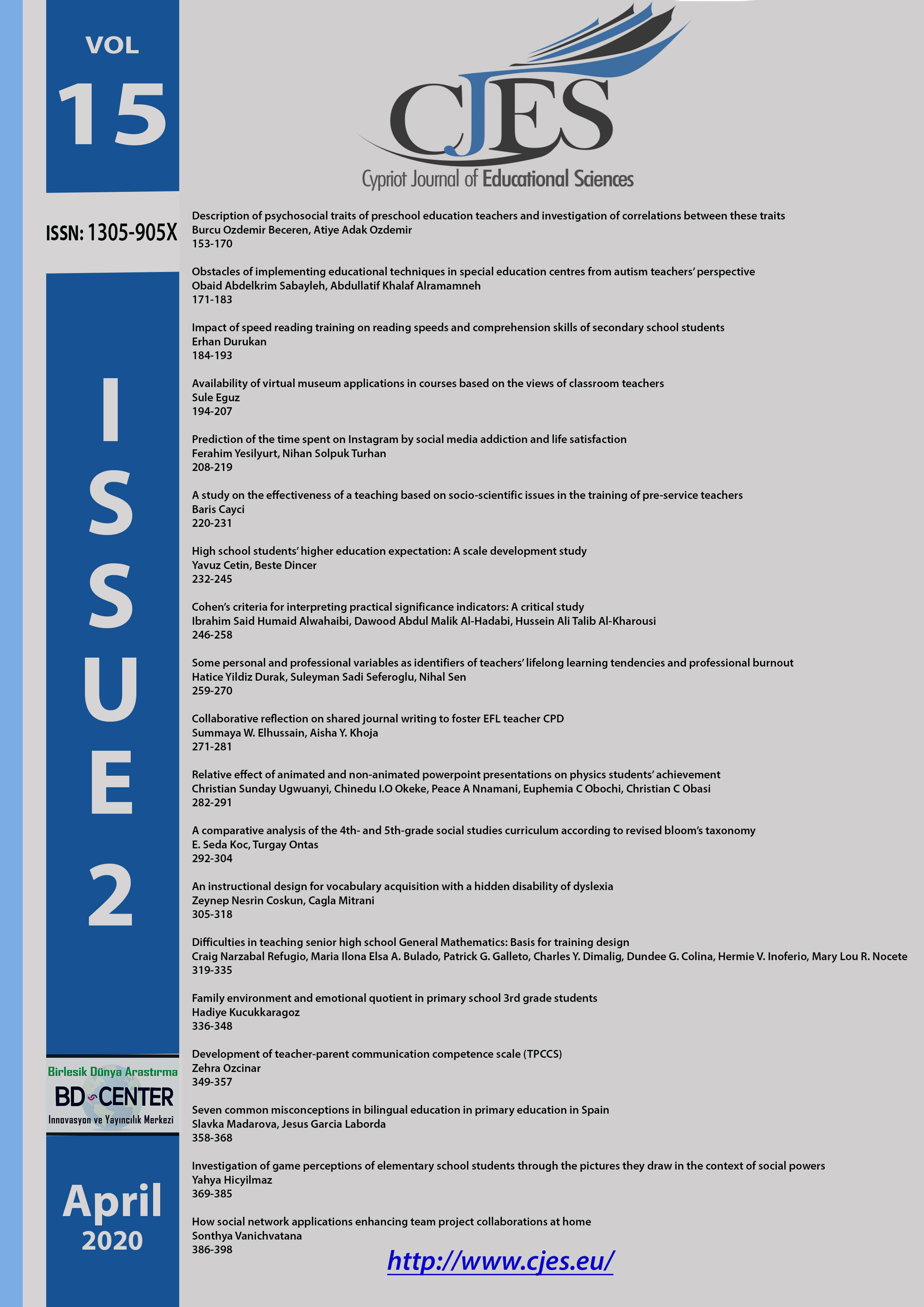
Cypriot Journal of Educational Sciences
Yazarlar: Steven M. Ross
Konular:-
Anahtar Kelimeler:-
Özet: Dealing with the challenges that economically disadvantaged students face in academic achievement,physical health, and social-emotional development is becoming increasing daunting throughout theworld. In the U.S., it is estimated that over one in five students nation-wide are disadvantaged. In urbanareas, such as Chicago, Memphis, Baltimore, and Philadelphia, the percentage increases to close to 90%.This Special Issue addresses these challenges for educators by examining diverse research-basedinterventions or “best practices” that directly impact the potential for disadvantaged and other at-riskpopulations of students to succeed.The initial paper, “Social-Emotional Learning: Championing Freedom, Education, and Development: Avehicle for At-Risk Students to Succeed,” authored by Mary Sheard, Alan Cheung, and myself, examinesthe use and effectiveness of a social-emotional learning program for students in Northern Irelandschools. Given the community’s history of violence between Protestants and Catholics, the paperpresents a perspective on at-risk students as those “living in communities traditionally divided andfractured by social, religious, and cultural intolerance, and sectarianism.” The purpose of the program,which was evaluated in a mixed methods randomized experiment, was to increase students’ skills indealing with emotions, interacting positively with peers and adults, and respecting diverse cultures.T he second paper, “Effects of Educational Technology Applications on Student Achievement forDisadvantaged Studies: What Forty Tears of Research Tells Us,” authored by Alan Cheung, focuses on* ADDRESS FOR CORRESPONDENCE: Johns Hopkins University, Center for Research and Reform in Education, Baltimore, USA,E-mail address: [email protected] / Tel: (800) 548-4994educational technology as an intervention for at-risk and disadvantaged students. Using meta-analysistechniques, Cheung examines evidence produced from rigorous studies examining four types oftechnology applications: comprehensive models, innovative technology applications, supplementalprograms, and computer-managed learning. Based on the results, he discusses strategic uses oftechnology applications to help disadvantaged and at-risk learners to achieve at higher levels.The third paper, “A Meta-analysis of a Cooperative Learning Model’s Effects on Student Achievementin Mathematics” was written by John Nunnery, Shanan Chappell, and Pamela Arnold. John A. Nunnery,Shanan Chappell, Pamela Arnold also using meta-analysis, it addresses the question of whether aparticular cooperative learning strategy, Student Teams Achievement Divisions, is beneficial in raisingthe achievement of at-risk learners. Synthesizing across 15 randomized studies, the authors examineeffects for both adolescent and younger children, and make suggestions for classroom applications.In a fourth paper, “Learning to Lead School Turnaround: The Mississippi LEADS ProfessionalDevelopment Model,” Matthew Clifford examines the design of, and early outcomes from, aprofessional development program for school principals working in a rural, economically disadvantagedregion of the U.S. The “Mississippi LEADS” professional development program is a year-long trainingexperience that includes executive coaching and establishes a state-wide and district-wide professionalsupport system for principals. The goal of is to turnaround chronically low performing schools byinvesting in leadership development, rather than replacing the school principal. Clifford discusses theprogram’s theory of action and how it is being implemented in multiple schools and districts in the state.In the final paper, “It Takes a City to ‘Raise’ a Systemic Reform: Early Outcomes from the Say Yes CitywideTurnaround Strategy in Syracuse,” I discuss an ambitious “city-wide” educational reform project inwhich I have been involved as a researcher. Specifically, “The Say Yes City-wide Turnaround Strategy,”pioneered in Syracuse, NY, is designed to involve diverse city-wide partners in improving education andrevitalizing the community and city. As an incentive and catalyst for change, college scholarships areoffered to every high school graduate in the city. But the major work involves improving educationalquality and support for students and families throughout the city. In my paper, I discuss the Say Yestheory of change, implementation processes, and early outcomes, with particular focus on how thereform is designed to remove barriers to educational success which normally face disadvantaged andminority students in urban areas.Best regardsProf. Dr. Steven M. Ross